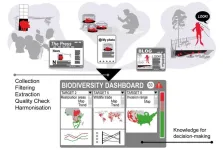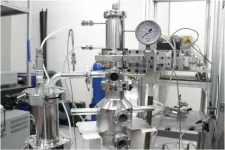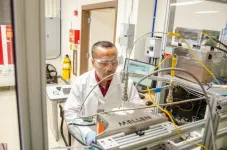(Press-News.org) Delays in diagnosing melanoma due to Covid-19 lockdown may have contributed to over 100,000 years of life lost across Europe and over £6bn in costs, mainly indirectly due to loss of productivity, finds a new study led by UCL and University Hospital of Basel researchers.
The authors of the new JAMA Network Open paper say their findings show how vital early detection of cancer can be, while also highlighting the importance of considering unintended side effects in any future pandemic planning.
Co-lead author Dr Kaustubh Adhikari (UCL Genetics, Evolution & Environment and The Open University) said: “When lockdowns were introduced as a much-needed measure to stop the spread of Covid-19, there were extensive unintended consequences. Many screenings were cancelled and medical treatments were delayed.
“As many people missed appointments to detect or treat skin cancer, their cancer progressed to a later stage, which resulted in more expensive care and a greater risk that the treatment would not be successful.
“It’s alarming that for just one disease, there were many years of life lost, a lower quality of life for many thousands of people, and billions of pounds of economic impact – this may be just the tip of the iceberg of the consequences of delayed diagnosis and treatment due to lockdowns. While the lockdowns did save many lives by mitigating the toll of Covid-19 itself, it is important that we learn from the experience to ensure that if another pandemic arises, we can effectively balance different healthcare priorities.”
The team of researchers, from the UK, Switzerland, Germany, US, Italy, Australia and Hungary, were investigating the health economic consequences of delays in diagnosing melanoma, a common type of skin cancer and one of the 10 most common cancers in Europe. The analysis was based on information from 50,072 patients of two cancer treatment centres in Switzerland and Italy, supported by further data from the UK and Belgium.
The researchers estimated how many people’s cancer would have progressed from one stage to the next due to delays in beginning or continuing treatment, as both screening services and treatments were disrupted in 2020 and 2021 due to lockdown restrictions, staff shortages, and fear of infection. They estimated that for roughly 17% of people with melanoma, their cancer would have progressed to a higher stage in 2020-2021, due to delays in diagnosis or treatment of two to three months or longer.
The research team then estimated the additional medical costs, as treating later-stage cancer is more expensive and comes with a lower chance of success. These cost estimates included both the direct costs to healthcare providers (such as the NHS), as well as the broader impacts such as the loss of productivity (indirect costs) due to disability and years of life lost.
The researchers estimated that delays to melanoma diagnoses contributed to 111,464 years of life lost across 31 countries in Europe, with a total economic cost of £6.1bn (€7.1bn or $7.7bn USD). Most of the costs (94.5%) were indirect costs such as loss of productivity.
Co-lead author Dr Elisabeth Roider (University Hospital of Basel) said: “Our findings show that preventative healthcare always needs to be a top priority, both in normal times and in times of crisis; any plans for potential future pandemics need to consider unintended side effects on a wide range of health conditions and plan holistically.
“Delays to diagnosis and treatment can be devastating to people affected by cancer, so getting prompt evaluation and treatment is vital for people concerned about their health, while screening programmes need to be treated as a priority by healthcare system leaders.”
The research was supported by the Research Foundation of the University of Basel, the ProPatient Foundation, University Basel, the Goldschmidt Jacobson Foundation, and the Swiss National Science Foundation.
END
Lockdown skin cancer diagnosis delays linked to deaths and £6bn costs in Europe
2024-02-16
ELSE PRESS RELEASES FROM THIS DATE:
RNA interference with zilebesiran for mild to moderate hypertension
2024-02-16
About The Study: In adults with mild to moderate hypertension, treatment with zilebesiran, an investigational RNA interference therapeutic, across a range of subcutaneous doses at 3-month or 6-month intervals significantly reduced 24-hour mean ambulatory systolic blood pressure at month three in this phase 2, randomized clinical trial.
Authors: George L. Bakris, M.D., of University of Chicago Medicine, is the corresponding author.
To access the embargoed study: Visit our For The Media website at this link https://media.jamanetwork.com/
(doi:10.1001/jama.2024.0728)
Editor’s ...
Electrification or hydrogen? Both have distinct roles in the European energy transition
2024-02-16
“Previous research has shown that our power system can be transformed to renewable sources like wind and solar at low cost and low environmental impact. However, the next question is how this renewable electricity can be used to substitute fossil fuel use in the buildings, industry and transport sectors. Our analysis shows that the direct use of electricity, for example, via electric cars and heat pumps, is critical for a broad range of sectors, while the conversion of electricity to hydrogen is important only for few applications,” ...
Toxoplasmosis: evolution of infection machinery
2024-02-16
Researchers have identified a protein that evolved concurrently with the emergence of cellular compartments crucial for the multiplication of the toxoplasmosis pathogen.
Toxoplasmosis is an infectious disease found worldwide, caused by the single-celled parasite Toxoplasma gondii. In humans, infection poses a particular risk to pregnant woman, as it can lead to birth defects. Like the closely related malaria pathogen – Plasmodium falciparum – and other related species, T. gondii possesses special organelles, so-called rhoptries ...
Online digital data and AI for monitoring biodiversity
2024-02-16
The random information posted online could be used to generate information about biodiversity and its conservation.
“I think it's quite amazing that images and comments that people post online can be used to infer changes on biodiversity”, says Dr. Andrea Soriano-Redondo, the lead-author of a new article published in the journal Plos Biology and a researcher at the Helsinki Lab of Interdisciplinary Conservation Science at the University of Helsinki.
Scientists from the University of Helsinki together with colleagues from other universities and institutions around the world propose a strategy for integrating online digital data from media platforms to complement ...
Heart attack significantly increases risk of other health conditions
2024-02-16
Having a heart attack significantly increases the risk of developing other serious long-term health conditions, a major new study shows.
Researchers at the University of Leeds have analysed more than 145 million records covering every adult patient admitted to hospital over a nine-year period to establish the risk of long-term health outcomes following a heart attack – in the largest study of its kind.
Whilst heart attacks are a serious and life-threatening condition, the British Heart Foundation estimates that nowadays more than seven in 10 people survive them, provided they receive quick and emergency treatment to get the blood flowing to the heart muscle again. Yet ...
Plasma technology for more effective lithium extraction
2024-02-16
New research suggesting a improved method for extracting lithium by applying plasma technology has been recently published.
On the 31st of January, the Korea Institute of Fusion Energy(KFE) announced revealed that their researchers have successfully increased the lithium extraction rate by three times compared to pre-existing methods by applying CO2 microwave plasma technology.
The most common method of extracting lithium is mixing sodium carbonate(Na2CO3) to saltwater that contains lithium and extracting lithium carbonate(Li2CO3)-which is a mixture of lithium and carbon dioxide. The downside to this method ...
Can astronomers use radar to spot a cataclysmic asteroid?
2024-02-16
How can humans protect the Earth from “devastating asteroid and comet impacts?” According to the National Academies and their 2023-2032 Planetary Science and Astrobiology Decadal Survey, ground based astronomical radar systems will have a “unique role” to play in planetary defense.
There is currently only one system in the world concentrating on these efforts, NASA’s Goldstone Solar System Radar, part of the Deep Space Network (DSN). However, a new instrument concept from the National Radio Astronomy Observatory ...
Self-monitoring improves physical activity of care-needing elderly
2024-02-16
Self-monitoring of physical activity with an accelerometer and feedback is an effective tool to improve physical activity in elderly people requiring long-term support. The Kobe University study is the first to show that with simple and safe means the physical activity of this demographic can be improved, which is expected to help prevent serious illness and reduce costs for long-term care.
Taking more steps and sitting less is well known as having a significant influence on a wide range of noncommunicable diseases such as heart disease, diabetes, orthopedic diseases and stroke. This is particularly problematic in senior citizens who depend on long-term care such as in day-care ...
WVU close to commercializing microwave technology that can cool down industry’s energy usage
2024-02-16
West Virginia University engineers have secured $3 million in U.S. Department of Energy funding to research a new chemical reactor system that uses microwaves to reduce industrial heat and carbon emissions.
The first-of-its-kind technology would allow industrial facilities to simultaneously produce ethylene and ammonia, two chemicals that contribute significantly to greenhouse gas emissions, within a single microwave reactor. That device uses heat from microwave electromagnetic radiation to carry out chemical reactions.
The ...
New Issue of GEN Biotechnology
2024-02-16
GEN Biotechnology announces the publication of its February 2024 issue. GEN Biotechnology publishes outstanding peer-reviewed research and perspectives in all aspects of biotechnology. The Journal, led by Editor-in-Chief Hana El-Samad, PhD (UCSF; Altos Labs) and Executive Editor Kevin Davies, PhD, is published bimonthly in print and online.
For full-text copies of articles or to arrange interviews with Dr. El-Samad, Dr. Davies, authors, or members of the editorial board, contact Kathryn Ryan at the Publisher.
1. Original Research: ...



